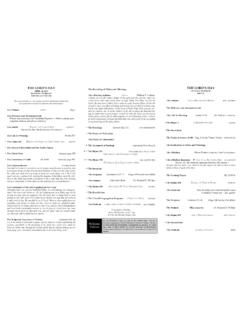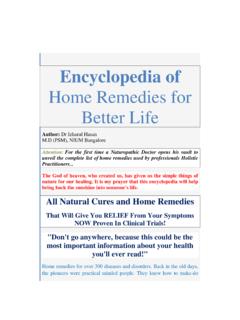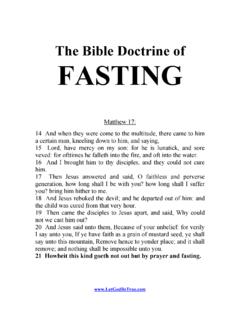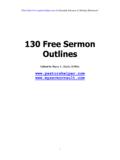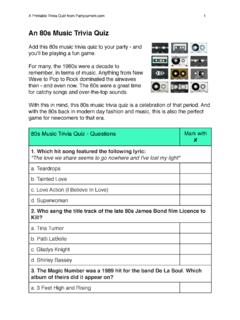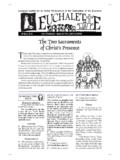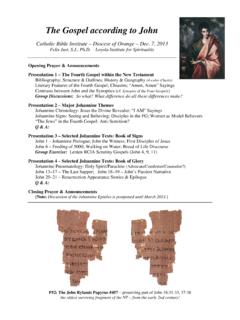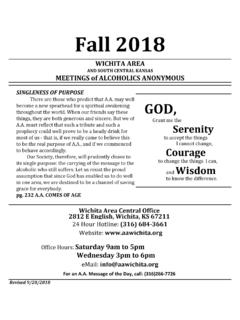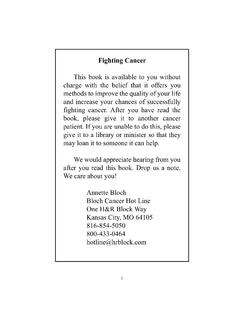Transcription of Reiki and Religious Freedom Legal Practice Issues for Reiki
1 Reiki and Religious FreedomReiki and Religious FreedomReiki and Religious FreedomReiki and Religious FreedomReiki and Religious FreedomLLLLL egal Practice Issues for Reikiegal Practice Issues for Reikiegal Practice Issues for Reikiegal Practice Issues for Reikiegal Practice Issues for Reikiby Diane Miller, have had many questions posed to me regarding the rights of practitioner groups to Practice during my work asa Legal advocate protecting consumers rights to access the healers and health practitioners of their choice. Infact I have supported the expansion of laws that allow many more practitioner groups to Practice without fear ofgovernment particular group of practitioners has come forward with special Legal concerns because their healing prac-tices are considered by some practitioners to be spiritual or based on the tenants of a particular church orreligion. For example, within the past year I have had questions posed to me from Reiki healers, some of whichconsider their practices to be spiritual in nature and other Reiki practitioners believing that their Practice isbased on universal energy and oneness.
2 Here are some of the questions posed to Reiki healers have a constitutional right to Practice Reiki without government regulation? Can the govern-ment regulate Reiki healers or any parts of their Practice ? Do Reiki healers have Freedom to heal in faith? Dothey have protection to do God s work without government interference? Do they have the right to be instru-ments of God and to allow a Higher Power to work through them without government regulation? Is Reiki Religious or spiritual in the eyes of Legal principles? If I become a Minister will my Reiki Practice beprotected?These questions reflect changes taking place in our health care system and perceptions. There are some that sayin the future all health care professionals and healers will need to have a deep understanding of human anduniversal energy in order to successfully heal others even conventional health care professionals, because remov-ing energy blockages will be understood to be the basic premise of all healing experiences.
3 But that is not truenow so we must sort out how the mind-body-spirit connection and the healing options associated with it arereflected in our might ask, what does healing have to do with laws? Can t just anyone heal? In our country the Legal answerto that question is complex. My hope is that this article will shed some light on the topic of spiritual healing andthe work is a result of research done on the laws of the states of Michigan and Minnesota and a review ofrelevant opinions of the United States Supreme Court. The goal was to assess whether the laws provide anexemption to criminal sanctions under the medical practices acts for unlicensed practitioners and healers practic-ing Reiki . And to further provide comment on the rights of spiritual healers under the Free Exercise Clause ofthe First Amendment to the United States of Health Freedom and Access to PractitionersHistory of Health Freedom and Access to PractitionersHistory of Health Freedom and Access to PractitionersHistory of Health Freedom and Access to PractitionersHistory of Health Freedom and Access to PractitionersHistorically our country has strong ideals of personal Freedom .
4 Persons have the right to seek out or refusemedical treatments in accordance with our freedoms of bodily integrity and autonomy. In addition persons havethe right to Practice their trades and professions without government interference and to enjoy the pursuit ofhappiness as they see fit. However sometimes personal freedoms are affected because the government has thepower to protect citizens from in American history it was clarified by case law that states, and not the federal government, have the rightand authority to utilize their police power to protect the health and welfare of their own citizens. As part of thisresponsibility and included in this police power states have the right to regulate professions of people within theirstate to protect the safety of their citizens. Of course the police power cannot be used indiscriminately becauseAmericans have fundamental constitutional rights, which the states are not free to regulate out of the state police powers have often been used to regulate health care professions in a number of ways onbehalf of the safety of the a state regulates a profession it must evaluate in fact whether there is a need for police power or whetherthe profession poses no risk of harm to the public and therefore not subject to government intervention.
5 InMinnesota there are criteria encoded in law for the legislature to review before imposing regulation on a profes-sion, one of which is: Whether the unregulated Practice of an occupation may harm or endanger the health, safety andwelfare of citizens of the state and whether the potential for harm is recognizable and not remote. MN Stat. Subd. 2. (a).A problem began almost one hundred years ago that affected consumers who wanted access to healers. Theproblem also affected health care practitioners that were not doctors. At that time, many states decided toregulate Physicians and Surgeons. Regulation took the form of licensing laws, which mandated that anyonepracticing medicine must have a medical license. States defined the Practice of medicine and there werecriminal sanctions put in place for the Practice of medicine without a license. The real problem with this planwas that they defined the Practice of medicine very broadly to include all of healing.
6 And thus the rest of thehealing world was arguably considered criminal. These laws were amended and strengthened through the yearsand the following are portions of the current definitions of the Practice of medicine in Minnesota and Michigan:Minn. Stat. (3)(3) Anyone who offers or undertakes to prevent or to diagnose, correct, ortreat in any manner or by any means, methods, devices, or instrumentalities, any disease, illness,pain, wound, fracture, infirmity, deformity or defect of any person.; MCL (1)(d): Practice of medicine means the diagnosis, treatment, prevention, cure, orrelieving of a human disease, ailment, defect, complaint, or other physical or mental condition, byattendance, advice, device, diagnostic tests, or other means, or offering, undertaking, attempting todo, or holding oneself out as able to do, any of these acts. In Minnesota the criminal charge for practicing medicine without a license is a gross misdemeanor.
7 In Michiganthe criminal charge is a the passage of these broad definition laws a number of groups have approached the legislature requestinglicensure laws of their own, thus carving out a specific area of Practice for themselves and making the Practice ofthat profession by others without a license a criminal charge. For example nurses, osteopaths, chiropractors, andmany others are now licensed in most states. In Minnesota there are 39 professions licensed by the state and anumber of registered and certified health care addition and also following the passage of the medical Practice act a number of unlicensed health care practi-tioner groups requested a simple exemption from the criminal charges based on either the fact that they posed norisk of harm to the public or that they had a constitutional right to Practice their trade. In some instances thesesimple exemptions passed into law. For example in many states there is an exemption for persons who heal underthe Christian Scientist religion, or person healing by means of prayer.
8 The language is different in every stateand the exemptions reflect the public policies of that particular state s culture. The following are the currentexemptions from the Practice of medicine for practitioners regarding religion and healing in Minnesota andMichigan: A Christian Scientist or other person who endeavors to prevent or cure disease or suffering exclu-sively by mental or spiritual means or by prayer. MN. Stat. (11) An individual who provides nonmedical nursing or similar services in the care of the ill or sufferingor an individual who in good faith ministers to the ill or suffering by spiritual means alone, throughprayer, in the exercise of a Religious Freedom , and who does not hold himself or herself out to be ahealth professional. MCL Sec. 16171 (d)Against this backdrop, this article will discuss the rights of individuals to do spiritual healing based on constitu-tional rights and Religious freedoms in states where there is no statutory exemption from the medical Practice will also discuss Legal Issues in the case where there already exists a statutory exemption allowing spiritualhealing.
9 And finally it will discuss the impact of new laws being recommended allowing other unlicensed healthcare providers to Practice , and how those new laws might affect the rights of spiritual healers to General Religious FreedomIn General Religious FreedomIn General Religious FreedomIn General Religious FreedomIn General Religious FreedomThe Free Exercise Clause of the First Amendment to the United States Constitution applicable to the states viathe fourteenth amendment1 mandates that Congress shall make no law respecting an establishment of religion,or prohibiting the free exercise thereof. 2 The United States Supreme Court has a long standing history of case law discerning and interpreting the consti-tution of the United States as it applies to the Free Exercise Clause of the First Amendment and the opinions andthe literature on this topic are of great quantity and complexity. I do not intend to summarize the entire topicarea. However what I offer here are key guiding principles and examples of what Legal Issues might surface aswe go forward to protect consumer access to persons that heal by spiritual Free Exercise Clause embraces both Freedom to believe and Freedom to act.
10 3 However Religious beliefs andreligious acts are considered separately. For instance, the Freedom to hold Religious beliefs and opinion However although persons are free to believe what they will and to teach and preach what theybelieve, when beliefs lead to conduct, the conduct is subject to regulation. 5 ( Although one is free tobelieve what one will, Religious Freedom ends when one s conduct offends the law by, for example, endangeringa child s )Limitations on Religious ConductLimitations on Religious ConductLimitations on Religious ConductLimitations on Religious ConductLimitations on Religious ConductAlthough Americans have an absolute right to believe what they want, the government has the power to regulatecertain spiritual conduct. This conclusion was developed in case law over time and courts refer to the coreconcept in Reynolds v. 7 stating: Laws are made for the government of actions, and while they cannot interfere with mere religiousbelief and opinion, they may with practices.


